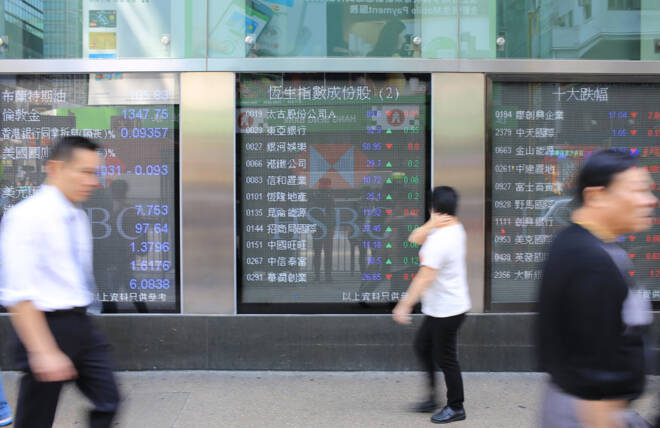Advertisement
Advertisement
Hang Seng Index, ASX 200, Nikkei 225 Index: Middle East Conflict and Earnings in Focus
By:
Investor Headwinds: Oil Prices Surge Amid Middle East Tensions vs. Better-Than-Forecasted US Bank Earnings.
Key Insights:
- Asian markets closed in negative territory on Friday; Hang Seng, Nikkei, and ASX200 struggled.
- US consumer price inflation, economic indicators from China, and sentiment toward the Middle East Conflict left the markets in the red.
- Updates from the Middle East will remain a focal point as earnings season gets underway.
Overview of the Friday Session
On Friday, the Hang Seng Index saw heavy losses, with the Nikkei 225 and the ASX200 also struggling.
US inflation figures for September left the US equity markets in negative territory on Thursday. The hotter-than-expected US CPI Report raised bets on a Fed interest rate hike, setting the tone for the Asian session.
The US equity markets responded to the shift in sentiment toward the Fed. On Thursday, the Nasdaq Composite Index and the S&P 500 declined by 0.63% and 0.62%, with the Dow falling by 0.51%.
Inflation and trade data from China added to the negative sentiment, fueling the Hang Seng Index retreat. Investor hopes of a pickup in factory gate prices faded, with producer prices falling for the twelfth consecutive month. Trade data also failed to impress despite a less marked decline in exports year-over-year.
The Monday Session: Middle East Conflict in Focus
Michigan consumer sentiment, inflation expectation figures, and a Nasdaq Composite Index sell-off may test the appetite for riskier assets. The Nasdaq Composite Index and S&P 500 ended the Friday session down 1.23% and 0.50%, respectively. However, the Dow gained 0.12%.
There are no economic indicators from the Asian region to consider on Monday. The lack of economic indicators will leave sentiment toward Fed monetary policy and news updates on the Middle East Conflict to guide the markets.
The threat of other nations entering the conflict will remain a headwind. Oil price trends will likely reflect sentiment toward the conflict. Brent Crude and WTI Crude Oil prices jumped 5.69% and 5.77%, respectively, on Friday.
However, bank stocks may find support from better-than-forecasted US bank earnings. Citigroup (C), JPMorgan Chase (JPM), and Wells Fargo (WFC) beat estimates. With earnings season underway, Rio Tinto Ltd (ASX 200) and Harvey Norman Holdings (ASX 200) release earnings on Monday.
In the Futures Markets, the ASX 200 and the Nikkei 225 were down 30 points and 370 points, respectively.
ASX 200
The ASX 200 declined by 0.56% on Friday. Risk-off sentiment weighed on the S&P/ASX All Technology Index (XTX), which slid by 1.50%. The big four banks also ended the session with losses.
The National Australia Bank (NAB) and Westpac Banking Corp (WBC) fell by 0.81% and 0.69%. ANZ Group (ANZ) and the Commonwealth Bank of Australia (CBA) ended the day down 0.58% and 0.62%.
Mining stocks had a mixed session. Rio Tinto (RIO) slipped by 0.10%. BHP Group Ltd (BHP) and Fortescue Metals Group (FMG rose by 0.38% and 0.66%, with Newcrest Mining (NCM) gaining 0.78%.
Oil stocks also had a mixed Friday. Woodside Energy Group (WDS) fell by 0.39%, while Santos Ltd (STO) gained 0.13%.
Hang Seng Index
On Friday, the Hang Seng Index slid by 2.33%. The Hang Seng Mainland Properties Index (HSMPI) was a drag, declining by 2.67%.
Alibaba Group Holding Ltd (HK:9988) and Tencent Holdings Ltd (HK:0700) tumbled by 3.79% and 3.10%.
Bank stocks also ended the day with losses. China Construction Bank (HK:0939) and the Industrial and Commercial Bank of China (HK:1398) fell by 1.07% and 1.79%, respectively.
HSBC Holdings PLC (HK:0005) declined by 1,11%.
Nikkei 225
(Graph for reference purposes only)
The Nikkei declined by 0.55% on Friday.
Bank stocks joined the broader market in negative territory. Sumitomo Mitsui Financial Group (8316) and Mitsubishi UFJ Financial Group (8306) fell by 1.53% and 2.02%. The main components of the Nikkei had a mixed session.
Tokyo Electron Limited (8035) and Fast Retailing Co (9983) gained 0.21% and 5.75%. Record profits supported by Uniqlo overseas sales drove demand for Fast Retailing Co stocks.
However, Sony Corp. (6758) declined by 1.95%, with SoftBank Group Corp. (9984) and KDDI Corp. (9433) seeing losses of 0.29% and 0.18%.
For upcoming economic events, check out our economic calendar.
About the Author
Bob Masonauthor
With over 28 years of experience in the financial industry, Bob has worked with various global rating agencies and multinational banks. Currently he is covering currencies, commodities, alternative asset classes and global equities, focusing mostly on European and Asian markets.
Advertisement
